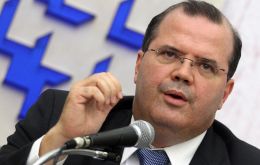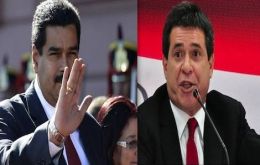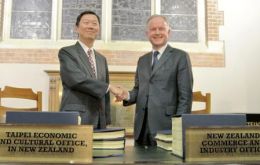MercoPress. South Atlantic News Agency
Stories for July 11th 2013
-
Thursday, July 11th 2013 - 17:02 UTC
Brazil ups basic rate to 8.5% to combat inflation; markets forecast 9.25%/10% by end of the year

Brazil’s central bank raised the benchmark interest rate a third consecutive time and anticipated that the tightening cycle may be extended through the rest of the year as policy makers fight inflation.
-
Thursday, July 11th 2013 - 16:57 UTC
Brazilian workers on “national struggle day” block the country’s main highways

Tens of thousands of workers across Brazil have walked off their jobs on Thursday in a nationwide strike demanding better working conditions and improved public services. Organized by Brazil’s biggest trade union federations, strikers are partially or completely blocking 17 highways in seven states.
-
Thursday, July 11th 2013 - 07:26 UTC
Summit in Montevideo could further expose the fragility of a Mercosur turned political

President-elect Horacio Cartes will not make any comments on the ongoing dispute of Paraguay with Mercosur until after the group’s summit in Uruguay next Friday, when official decisions on the subject are expected to be made public. However for both sides any decision will most probably be challenging and ratify that Mercosur has become a political group far from its original trade and investment purposes.
-
Thursday, July 11th 2013 - 07:22 UTC
Falklands: Ambassador Castro renews sovereignty claims and blasts the US for spying

Argentine ambassador to the United Kingdom Alicia Castro renewed Argentina’s sovereignty claims over the Falkland Islands and put the Edward Snowden spy row on London’s table: “We are free nations that neither need nor want to be spied on,” Castro warned.
-
Thursday, July 11th 2013 - 07:14 UTC
After twenty years of negotiations US opens its market to Uruguayan citrus

After almost twenty years of negotiations United States confirmed the opening of its market to citrus from Uruguay, which will become effective next 9 August when certain coordination and logistics tasks are coordinated by both countries.
-
Thursday, July 11th 2013 - 07:08 UTC
Eight times Manhattan island iceberg breaks off from Antarctic glacier

Pine Island Glacier (PIG), the longest and fastest flowing glacier in the Antarctic, has spawned a huge iceberg. The block measures about 720 sq km in area - roughly eight times the size of Manhattan Island in New York.
-
Thursday, July 11th 2013 - 07:04 UTC
China blesses Taiwan economic accords if ‘one-China’ policy is respected

China accepts that Taiwan signs economic cooperation agreements with other countries as long as they are not political and those countries do not interfere with the ‘one China policy’ which considers the island a province part of the nation, and not two nations as defended by Taipei.
-
Thursday, July 11th 2013 - 06:58 UTC
One third of world’s population benefits from effective tobacco control measure

At 2.3 billion, the number of people worldwide covered by at least one life-saving measure to limit tobacco use has more than doubled in the last five years, according to the WHO Report on the Global Tobacco Epidemic 2013. The number of people covered by bans on tobacco advertising, promotion and sponsorship, the focus of this year’s report, increased by almost 400 million people residing mainly in low- and middle-income countries.
-
Thursday, July 11th 2013 - 06:53 UTC
Time for China to become more Brazilian

By Markus Jaeger (*) - What could China possibly learn from Brazil, economically? After all, real GDP growth in Brazil averaged 2.75% annually over the past three decades, compared to 10% in China. Moreover, Brazil’s consumption-oriented growth model is about to exhaust itself, while China’s investment-focussed strategy continues to generate high, if somewhat diminished economic growth.
-
Thursday, July 11th 2013 - 06:43 UTC
IMF: US pull-back from stimulus could trigger reversal in capital flows and hurt developing countries

The International Monetary Fund trimmed its global growth forecast for the fifth time since early last year due to a slowdown in emerging economies and the woes in recession-struck Europe. In its mid-year health check of the world economy, IMF also warned global growth could slow further if the pull-back from massive monetary stimulus in the United States triggers reversals in capital flows and crimps growth in developing countries.
